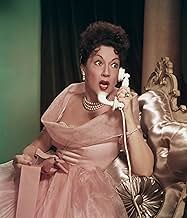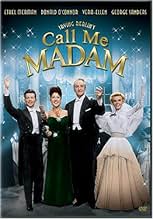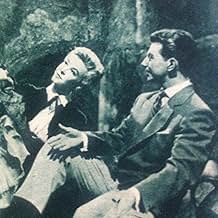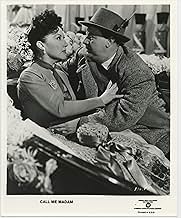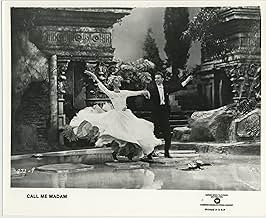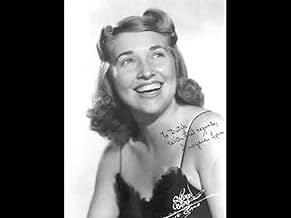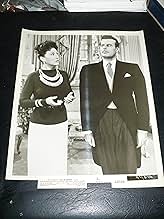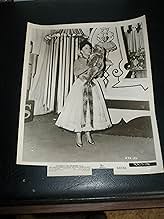PUNTUACIÓN EN IMDb
6,7/10
1,5 mil
TU PUNTUACIÓN
Sally Adams se convierte en embajadora estadounidense de la era Truman ante un gran ducado europeo.Sally Adams se convierte en embajadora estadounidense de la era Truman ante un gran ducado europeo.Sally Adams se convierte en embajadora estadounidense de la era Truman ante un gran ducado europeo.
- Dirección
- Guión
- Reparto principal
- Ganó 1 premio Óscar
- 3 premios y 4 nominaciones en total
Ludwig Stössel
- Grand Duke Otto
- (as Ludwig Stossel)
David Ahdar
- Dancer
- (sin acreditar)
Elizabeth Allan
- Singing Telephone Operator
- (sin acreditar)
Leon Alton
- Minor Role
- (sin acreditar)
Hanna Axmann-Rezzori
- Telephone Switchboard Operator
- (sin acreditar)
Leon Belasco
- Band Leader
- (sin acreditar)
Reseñas destacadas
Movie audiences got a treat in Call Me Madam because they got to see Ethel Merman repeat one of two of her Broadway roles for the screen, the other being in the first Anything Goes.
For some reason, movie audiences never really took to Ethel. She did some parts during the Thirties, but in the Forties worked exclusively on Broadway. Mary Martin suffered a similar fate and we never got to see any of her Broadway starring roles with the exception of the famous telecast of Peter Pan.
Irving Berlin wrote the score for Call Me Madam and the book is based on the colorful life of Perle Mesta, famous Washington socialite who Harry Truman made ambassador to Luxembourg.
That's the way of things in Washington. Both parties with a new administration give ambassadorships out to wealthy contributors and Perle Mesta, an oil widow was one of the wealthiest.
Ethel is appointed by President Truman as Ambassador to the mythical duchy of Lichtenburg. Her rather informal style sets some professional State Department teeth rattling and during the course of the film both causes and solves a diplomatic crisis. Her personal assistant, Donald O'Connor is in her corner, but the chief of Protocol Billy DeWolfe is at his wit's end.
Both Ethel and Donald find romance in Lichtenburg, she with Count George Sanders and he with Vera-Ellen. When things aren't looking so good, they console each other with the hit song of Call Me Madam, You're Just In Love. This is what you call a contrapuntal melody with both members of the duet singing different melodies at the same time. At the same time this one was hitting the jukeboxes, another contrapuntal by Berlin, Play A Simple Melody was revived by Bing Crosby and his son Gary. To my knowledge no other major composer has ever had a hit with one of those.
George Sanders surprised quite a few folks with his singing voice. They needn't have been, he in fact had appeared in some musicals on the London stage before going into film. And he drops the sneer that usually accompanies most of us film characters and makes a most dashing and romantic count.
Dropped from the film version was Irving Berlin's tribute to Dwight D. Eisenhower which became his campaign theme song, I Like Ike. I guess it was considered redundant since the American people already had him. There are many references to Harry in the book and how Ethel was going to not let him down in the position he placed her in.
Billy DeWolfe steals every scene he's in as the fussy officious career foreign service employee, Pemberton Maxwell. If there ever was a name for a stuffy career WASP diplomat, that's it. They were a ripe target back then, certain politicians made a living on accusing a whole flock of them as traitors. One of them was Truman's Secretary of State, Dean Acheson. There manner didn't play well in what we would now call red state America.
Call Me Madam is bright and funny with a great score and some fabulous performances. Can't do better than that.
For some reason, movie audiences never really took to Ethel. She did some parts during the Thirties, but in the Forties worked exclusively on Broadway. Mary Martin suffered a similar fate and we never got to see any of her Broadway starring roles with the exception of the famous telecast of Peter Pan.
Irving Berlin wrote the score for Call Me Madam and the book is based on the colorful life of Perle Mesta, famous Washington socialite who Harry Truman made ambassador to Luxembourg.
That's the way of things in Washington. Both parties with a new administration give ambassadorships out to wealthy contributors and Perle Mesta, an oil widow was one of the wealthiest.
Ethel is appointed by President Truman as Ambassador to the mythical duchy of Lichtenburg. Her rather informal style sets some professional State Department teeth rattling and during the course of the film both causes and solves a diplomatic crisis. Her personal assistant, Donald O'Connor is in her corner, but the chief of Protocol Billy DeWolfe is at his wit's end.
Both Ethel and Donald find romance in Lichtenburg, she with Count George Sanders and he with Vera-Ellen. When things aren't looking so good, they console each other with the hit song of Call Me Madam, You're Just In Love. This is what you call a contrapuntal melody with both members of the duet singing different melodies at the same time. At the same time this one was hitting the jukeboxes, another contrapuntal by Berlin, Play A Simple Melody was revived by Bing Crosby and his son Gary. To my knowledge no other major composer has ever had a hit with one of those.
George Sanders surprised quite a few folks with his singing voice. They needn't have been, he in fact had appeared in some musicals on the London stage before going into film. And he drops the sneer that usually accompanies most of us film characters and makes a most dashing and romantic count.
Dropped from the film version was Irving Berlin's tribute to Dwight D. Eisenhower which became his campaign theme song, I Like Ike. I guess it was considered redundant since the American people already had him. There are many references to Harry in the book and how Ethel was going to not let him down in the position he placed her in.
Billy DeWolfe steals every scene he's in as the fussy officious career foreign service employee, Pemberton Maxwell. If there ever was a name for a stuffy career WASP diplomat, that's it. They were a ripe target back then, certain politicians made a living on accusing a whole flock of them as traitors. One of them was Truman's Secretary of State, Dean Acheson. There manner didn't play well in what we would now call red state America.
Call Me Madam is bright and funny with a great score and some fabulous performances. Can't do better than that.
Carol Channing, Mary Martin, Ethel Merman - the three biggest stars of Broadway between 1940 and 1970, and none made as big an imprint in movies. This seems to be a running sore in cinematic history - so few stage stars were great film figures. Some, like George M. Cohan, did not like the restrictive effects of movie making, and made few stabs at film (though, fortunately, Cohan made THE PHANTOM PRESIDENT in 1932). Others just seemed to weak on film. The great Pauline Lord made one movie, the pathetic MISS WIGGS OF CABBAGE PATCH, which (if recalled at all) is remembered as a film "starring" (he was actually in a supporting role) W.C.Fields. Channing, star of GENTLEMEN PREFER BLONDS watched while that role went to Marilyn Monroe, and star of HELLO DOLLY watched as that role went to Barbara Streisand. Martin, star of SOUTH PACIFIC saw Mitzi Gaynor play Nellie Forbush, and star of THE SOUND OF MUSIC saw the role of Maria Von Trapp become identified with Julie Andrews. Merman with credits like ANYTHING GOES, PANAMA HATTIE, ANNIE GET YOUR GUN, and GYPSY, only was able to keep the role of Reno Sweeny in ANYTHING GOES, when it was first made into a film in the 1930s. She was fortunate to also have the role of Sally the ambassador in CALL ME MADAM on film. It was a rarity, because she knew the part and was able to shine in a film adaptation. It's success probably enabled her to get another lead in the musical THERE'S NO BUSINESS LIKE SHOW BUSINESS. But the latter film, despite her good work in it (and Dan Dailey's, Mitzi Gaynor, and Donald O'Connor's)is recalled because Marilyn Monroe sang "We're Having a Heat Wave". Merman never led in another musical film again, and would be overlooked for GYPSY (when Rosalind Russell got the part).
At least here and in the first ANYTHING GOES we see how she handled stage roles in her career. Mary Martin was less successful, her film record of her stagecraft limited to the scene in the first Cole Porter biopic NIGHT AND DAY, when she sings the song MY HEART BELONGS TO DADDY as she did on stage (unfortunately two of her chorus, Gene Kelly and Van Johnson, were not asked to repeat their chorus boy parts). There is the television version of PETER PAN, which is on video. It's fortunate that exists (there is also some songs from SOUTH PACIFIC that were sung with Ezio Pinza on THE ED SULLIVAN SHOW). The rest is silence. As for Channing, the only time she appeared in a movie musical, it was as the wacky aunt of Mary Tyler Moore in THOROUGHLY MODERN MILLIE (a movie not based on any stage musical). Channing had little singing to do in it.
So Merman was able to do one great performance on film. CALL ME MADAM, a musical spoof on the career of political hostess Pearl Mesta, was a charming little musical (no ANNIE GET YOUR GUN, though). It's best musical moment is the duet with Donald O'Connor (I HEAR MUSIC BUT I DON'T KNOW WHERE), and it is a romantic piece of fluff. Nice also to see George Sanders playing a decent chap for a change. But watching Merman at her best, makes one regret what was not captured on film of her other performances. Ironically, that great singing voice is best recalled as a "loud-mouth broad" voice from Merman's best remembered role: the obnoxious mother-in-law of Milton Berle in IT'S A MAD, MAD, MAD, MAD WORLD.
At least here and in the first ANYTHING GOES we see how she handled stage roles in her career. Mary Martin was less successful, her film record of her stagecraft limited to the scene in the first Cole Porter biopic NIGHT AND DAY, when she sings the song MY HEART BELONGS TO DADDY as she did on stage (unfortunately two of her chorus, Gene Kelly and Van Johnson, were not asked to repeat their chorus boy parts). There is the television version of PETER PAN, which is on video. It's fortunate that exists (there is also some songs from SOUTH PACIFIC that were sung with Ezio Pinza on THE ED SULLIVAN SHOW). The rest is silence. As for Channing, the only time she appeared in a movie musical, it was as the wacky aunt of Mary Tyler Moore in THOROUGHLY MODERN MILLIE (a movie not based on any stage musical). Channing had little singing to do in it.
So Merman was able to do one great performance on film. CALL ME MADAM, a musical spoof on the career of political hostess Pearl Mesta, was a charming little musical (no ANNIE GET YOUR GUN, though). It's best musical moment is the duet with Donald O'Connor (I HEAR MUSIC BUT I DON'T KNOW WHERE), and it is a romantic piece of fluff. Nice also to see George Sanders playing a decent chap for a change. But watching Merman at her best, makes one regret what was not captured on film of her other performances. Ironically, that great singing voice is best recalled as a "loud-mouth broad" voice from Merman's best remembered role: the obnoxious mother-in-law of Milton Berle in IT'S A MAD, MAD, MAD, MAD WORLD.
I came across this thrilling 1953 Fox musical last night by accident and I was immediately hooked. Actually, it became an instant favorite. "Call Me Madam" is loud, sumptuous, indescribably glorious screen version of Irving Berlin's stage musical, directed with luminous extravagance by Walter Lang. The Technicolor is breathtaking! Ethel Merman as the eccentric socialite turned US diplomat to Lichtenburg, is sometimes hard to take. Her romance with the heavily accented Foreign Minister named Cosmo, played by George Sanders, is slightly forced.
Still, the highlights are the captivating Berlin songs - "Hostess With The Mostes", "You're Just In Love", "Something to Dance About", "It's a Lovely Day Today" - not to mention the glorious dancing by the young couple in love, Donald O'Connor and Vera-Ellen. They were a joy to watch.
Still, the highlights are the captivating Berlin songs - "Hostess With The Mostes", "You're Just In Love", "Something to Dance About", "It's a Lovely Day Today" - not to mention the glorious dancing by the young couple in love, Donald O'Connor and Vera-Ellen. They were a joy to watch.
Thanks to the Fox Movie Channel one can rediscover forgotten things that don't show on television these days. It was a royal treat to have this film play the other night. We had seen the film years ago, but one forgets how much fun it was and how it still can delight anyone at all.
It helps a great deal this musical score was written by Irving Berlin, perhaps one of the most talented American composers of all times. The music of "Call Me Madam" can't be considered his best, but it pleases the viewer when it plays on the screen. The direction by Walter Lang also was an asset; even though it's filmed musical theater, it doesn't feel claustrophobic.
Ethel Merman was a magnificent star of the New York Broadway stage. She was a legend in the way she could sing a song and she could be heard in the whole theater; no mikes for Ms. Merman!. She was an original who was a consumed entertainer; she graced many musicals during her lifetime. It shows how foolish Hollywood was in not letting Ms. Merman repeat some of the same roles she created for the theater. It's sad, but it's a great loss.
Donald O'Connor does some of his best work in films in the movie. He plays well against Ms. Merman, as well as against Vera Ellen, his love interest in the film. Mr. O'Connor and Ms. Ellen are charming in their roles.
A great surprise was to see George Sanders, a man who played heavies, or cynical characters on the screen, singing and acting with enough suavity to charm Ms. Merman. Also in the cast, Walter Slezak, Billy DeWolfe, who are also effective in their supporting roles.
This is a film that will delight anyone looking for a pleasant time watching a delightful musical.
It helps a great deal this musical score was written by Irving Berlin, perhaps one of the most talented American composers of all times. The music of "Call Me Madam" can't be considered his best, but it pleases the viewer when it plays on the screen. The direction by Walter Lang also was an asset; even though it's filmed musical theater, it doesn't feel claustrophobic.
Ethel Merman was a magnificent star of the New York Broadway stage. She was a legend in the way she could sing a song and she could be heard in the whole theater; no mikes for Ms. Merman!. She was an original who was a consumed entertainer; she graced many musicals during her lifetime. It shows how foolish Hollywood was in not letting Ms. Merman repeat some of the same roles she created for the theater. It's sad, but it's a great loss.
Donald O'Connor does some of his best work in films in the movie. He plays well against Ms. Merman, as well as against Vera Ellen, his love interest in the film. Mr. O'Connor and Ms. Ellen are charming in their roles.
A great surprise was to see George Sanders, a man who played heavies, or cynical characters on the screen, singing and acting with enough suavity to charm Ms. Merman. Also in the cast, Walter Slezak, Billy DeWolfe, who are also effective in their supporting roles.
This is a film that will delight anyone looking for a pleasant time watching a delightful musical.
I remember seeing Call Me Madam as a teenager when it first came out as a movie in 1953. There was the great Ethel Merman on the screen. I had never heard of her before as to who she was, but I saw the movie so many times that it is still very vivid in my mind. Always yelling "Hello Harry" every time the phone rang, when Billy De Wolfe tried to tell her that one of his jobs was to tell her how to dress, and she looked at him in his outfit with striped pants and quipped, "You're going to tell me how to dress? Your coat and pants don't even match!" But, the surprise of the movie was George Sanders singing especially his song "Marrying for Love". Who would have known that he had such a rich baritone voice. This was probably Vera Ellen's best movie including "Three Little Words" with Fred Astaire. She and Donald O'Connor were perfect in their dance numbers together. Ethel Merman's rendition of "The International Rag" was brassy and sassy the way only Ethel Merman could deliver it with the end of the song singing, "Oh, oh! Wiggle your personality!" and someone in the audience said, "She sure can wiggle it; can't she?" It was if as soon as you sat down to watch this wonderful musical, it was time to leave the theater. I understand that the film is finally going to be released on Video. It's about time. I'll buy one copy to look at and another to keep just in case. Wonderful entertainment. One of the best!
¿Sabías que...?
- CuriosidadesThis is the only full film musical that George Sanders made, despite his appealing singing voice.
- Citas
Cosmo Constantine: You are the most American American I have ever met.
Sally Adams: That's the nicest thing anyone's ever told me.
- Créditos adicionalesDuring the opening credits, as each word in the title appears onscreen, we hear, but do not see, Ethel Merman exclaiming, in a demanding tone of voice: "Call..me..madam!"
- ConexionesFeatured in Fred Astaire Salutes the Fox Musicals (1974)
- Banda sonoraOverture
Music and Lyrics by Irving Berlin
Performed by Ethel Merman and the 20th Century-Fox Studio Orchestra and Chorus
Selecciones populares
Inicia sesión para calificar y añadir a tu lista para recibir recomendaciones personalizadas
- How long is Call Me Madam?Con tecnología de Alexa
Detalles
- Duración1 hora 54 minutos
- Relación de aspecto
- 1.37 : 1
Contribuir a esta página
Sugerir un cambio o añadir el contenido que falta


